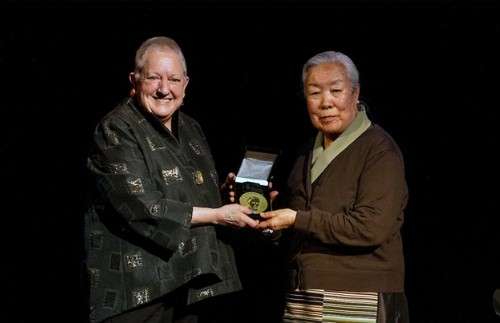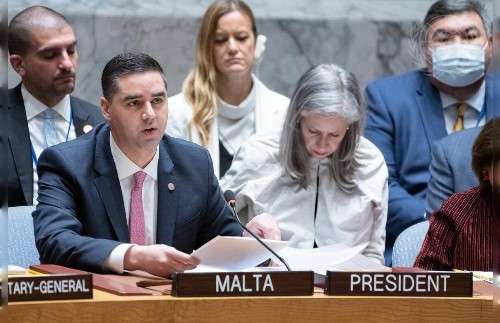Golnaz Esfendiari
RadioFreeEurope/RadioLiberty
Officials including Iran’s vice president for women’s affairs have publicly questioned the state broadcaster’s motives in airing a married couple’s account of physical abuse and reconciliation, suggesting that the program risks normalizing violence against women and encouraging victims to stay in abusive relationships.
Iranian TV program Formula One broadcast the interview last week with a self-described abusive husband alongside his wife and two of their young daughters. In it, the man said that despite two decades of beatings and 27 attempts by his wife to divorce him, the family has managed to stay together.

The couple divorced at one point, he said, but remained apart for just 60 days.
We would miss each other…. A phone call, and we were together again,” the man said, adding that they deserve a place on the list of Guinness World Records for their numerous divorce requests.
After confirming that the man had first beaten his wife “on the first night of our marriage,” the moderator laughs and responds, “What a thing to do.” Then to camera he adds, “We’re not promoting it, and we’re not saying what he did was wrong.”
Iranian experts warned last year of a rise in domestic violence against women, noting that financial problems and a lack of education frequently exacerbate the problem.
‘My Husband Must Beat Me’
Under Iranian law, courts give less weight to women’s testimony than to that of men, but it is unclear whether such discriminatory legislation has played any part in this particular marital saga.
The husband does most of the talking with the show’s male interviewer, but despite sometimes appearing uncomfortable the wife several times defends her husband.
“Not really,” she said, smiling nervously, when asked whether she had objected the first time her husband struck her.
“What does that mean,” the moderator followed up.
She looked at her husband.
The moderator pressed her again, saying, “You thought: ‘My husband must beat me.'”
“No,” she said, adding, “I was upset with him, but I was a kid. I was 16. I didn’t know much.”
The husband said he’d come on TV to say that change was possible, even for someone who had beaten his wife for many years.
But the corollary of that message was the problem, in the eyes of Massumeh Ebetkar, the vice president for women’s and family issues in President Hassan Rohani’s cabinet.
“A common life in the shadow of beatings? What is the point of this interview?” Ebetkar asked via Telegram, a messaging app that was banned last year in Iran but which remains popular among tech-savvy Iranians.
“Are you presenting this image of a married life to encourage the youth, particularly girls, to get married? Or are these models aimed at normalizing violence against women?”
Criticism
Another government minister, Communications Minister Mohammad Javad Azari Jahromi, was also quoted questioning the wisdom of the broadcast.
“There is no need to teach women to tolerate beatings to consodilate families,” Jahromi said, according to local media.
Lawmaker Parvaneh Mafi, who heads a women’s faction in the parliament, said the interview promoted domestic violence against women while weakening their place in families.
In a letter to state broadcasting director Ali Askari, Mafi asked: “How would you feel if a man says with a laugh to the camera that he’s been beating his wife from the first day of their marriage while a woman who is sitting next to their daughters talks about multiple unsuccessful attempts at divorce?”
There were condemnations on social media, too.
“State TV with its large audience is directly teaching [women to] be beaten, have patience, then we will bring you in front of the cameras so that everyone applauds you. This is violence in itself,” journalist Taraneh Baniyaghu wrote on Twitter.
Lawyer Maryam Hajimohammadi posted a video clip of the controversial interview on Twitter and argued that “the whole art of the couple that state TV invited onto its show was to beat and be beaten.”
“The ideal couple of the State Broadcaster,” she added.
The popular Fararu website asked whether the state TV interview might lead to a decrease in domestic violence or rather an increase in “the culture of acceptance and humiliation of women” at a time when official data show that 60 percent of Iranian women have experienced domestic violence at least once in their life.
A report last year suggested that nearly three in 10 Iranian women who had been in a relationship said they had been subjected by that partner to physical or sexual violence.
A study in 2017 by an Iranian charity claimed that 32 percent of women in urban areas and 63 percent of women in rural Iran had experienced some form of domestic violence.
Officials and women’s rights activists have suggested that many women suffer from domestic abuse without speaking up because of the social stigma.
A state television manager, Fazollah Shariatpanahi, suggested that the controversial interview was aimed at discouraging divorce — which has reportedly been on the rise, worrying hard-liners who see it as an abdication of Islamic values.
Shariatpanahi speculated that the couple had been invited to demonstrate that “those who have decided to divorce can return to their life together.”
But he said there was a “one-sided atmosphere” on social media and that “only the beatings” had been highlighted.
State-dominated TV has been long criticized for giving an unrealistic and cliched image of Iranian women and promoting a traditional role for women, often as submissive housewives.
Last year, the state broadcaster apologized after an “expert” told victims of domestic violence to kiss their husband’s feet in order to experience “a miracle” in their life.
Copyright (c) 2019. RFE/RL, Inc. Reprinted with the permission of Radio Free Europe/Radio Liberty, 1201 Connecticut Ave NW, Ste 400, Washington DC 20036









